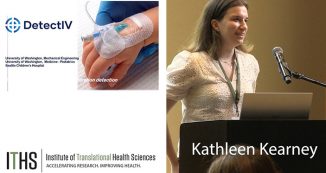21 Aug Researcher Spotlight: Featuring Nathan White

Nathan White, MD, MS
Dr. Nathan White, an Assistant Professor of Emergency Medicine at the University of Washington and Attending Physician at Harborview Medical Center, is guided by the philosophy of identifying a problem and then attacking it from all angles. This philosophy is serving him well in his current research as he seeks both diagnosis and treatment options related to bleeding in critical illness and injury.
Uncontrollable bleeding is one of the main causes of death for injured trauma patients. Emergency department staff has a very limited amount of time available to stop the bleeding if they are going to save the life of a patient. This process becomes even more complicated if a patient has trauma-induced coagulopathy or other impairments of their blood clotting system.
“I deal with bleeding issues pretty much every day at Harborview,” said Dr. White. “It is a big problem that has to be recognized and treated very quickly.”
Dr. White is currently working on two separate research projects to address these treatment challenges. His first project is a diagnostic device that can be used to rapidly identify bleeding disorders in trauma patients. The device is designed to measure platelet function and was developed in partnership with Dr. Nathan Sniadecki of the UW Department of Mechanical Engineering. A startup company, Stasys Medical Corp., has been created with the assistance of the UW Center for Commercialization (C4C), and the device has been prototyped to a small tabletop device with plans to begin an observational trial at Harborview Medical Center in January, 2015.
Dr. White is also developing a next-generation treatment for bleeding in the form of an injectable biopolymer-hemostat. The goal of the treatment, once developed, is to strengthen blood clot formation and stop bleeding from internal wounds. This project is a partnership with Dr. Suzie Pun of the UW Department of Bioengineering and recently received funding from the National Institutes of Health for preclinical development.
Dr. White has been supported by the Institute of Translational Health Sciences throughout this research. He is an ITHS KL2 Scholar, which is a multi-disciplinary program of up to five years in length that provides in-depth training in a specific area of translational research. The program also provides a breadth of training about the full spectrum of clinical investigation.
“ITHS support of my career has been key (to these two projects),” said Dr. White. “I’ve been a KL2 scholar for three years, and it has played a huge part in my work because of the research tools it makes available and the time it allows to focus on my research.”
Dr. White was also the recipient of an ITHS small pilot project grant, which funded the creation of the preliminary data used to support the NIH funding application. In addition, the diagnostic device he is developing with Dr. Sniadecki benefitted from a funding collaboration between ITHS, the Coulter Translational Research Partnership at UW, the C4C, the Life Sciences Discovery Fund, and the Washington Research Foundation. This collaboration was highlighted in a 2013 article in the Puget Sound Business Journal.
“I am just an ER doc, and can’t pretend to be an expert in everything, so my research requires the kind of collaborative and multidisciplinary approach that ITHS really supports,” concluded Dr. White.
To learn more about how ITHS can support your research, please contact the ITHS Research Navigator.







